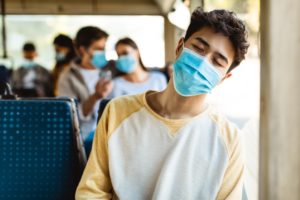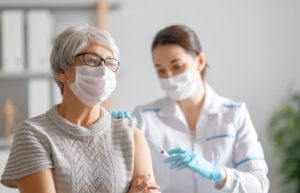COVID-19 and Sleep: An Ongoing Concern
This series of articles are for informational purposes only. Consult your local medical authority for advice. For up-to-date information on the COVID-19 outbreak and vaccine, visit CDC.gov.
In March 2020, the novel coronavirus – COVID-19 – disrupted many aspects of daily life across the globe. With profound economic, health, and social consequences as well as 24-hour news focused on the pandemic’s impact, it comes as no surprise we have seen significant impacts on sleep.
Sleep disruptions have manifested in different ways. Stress and anxiety related to the pandemic can lead to sleep loss and feelings of daytime fatigue. Some frontline workers and essential employees also face the added challenge of working longer shifts that force them to alter their sleep schedules. Additionally, social distancing, remote learning, and restrictions on normal activities have left many people struggling with depression and isolation, increasing their risk for sleep disorders like insomnia.
In the pages that follow, we offer our most up-to-date and informative articles with expert commentary on COVID-19, available vaccines currently in-market and where to get them, and the pandemic’s overall impact on sleep.
“I think it’s important for people to understand that sleep does not exist in isolation, and that anxiety, depression, alcohol, and substances all affect sleep. If we respond to anxiety and depression with substances… we’re going to compound sleep problems”
Dr. Brian Abaluck, COVID-19 roundtable participant
The right amount of sleep is imperative to maintaining your health and wellness. With this, we recommend following a consistent routine that includes going to bed and waking up at the same times each day. Spending a lot of time in front of a television or phone may be tempting as a result of social distancing, but these devices can cause mental overstimulation while also emitting blue light that can negatively impact sleep cycles. Other healthy sleep strategies include exercising on a daily basis, spending time outdoors during the day for natural light exposure, and limiting your alcohol and caffeine intake in the hours leading up to bedtime.
The importance of healthy sleep during this pandemic cannot be overstated. A good, unencumbered night’s rest is essential for a strong immune system and healthy brain functioning. Sleep also plays a pivotal role in how we manage our moods and mental health.
At Sleep Foundation, we actively survey the most recent updates from the Centers for Disease Control. Remember, if you experience new or worsening sleep problems, you should contact your doctor. Many medical professionals are available virtually for patients who would rather not visit offices in person.




